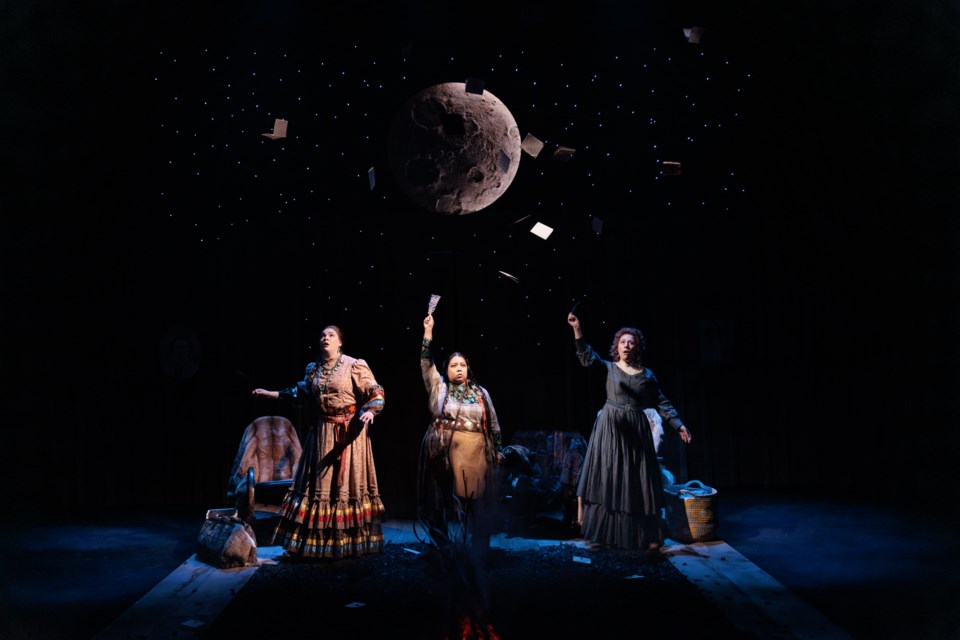In 1800 and something-something, somewhere upon the banks of a reddish river in Treaty One Territory, three very different women clad in fur – Métis Marie Angelique, Ojibwe Eugenia, and pregnant British settler Cecilia – ponder their lives in 21st century slang, fight boredom with silly games while dropping names like Truman Capote, Andy Warhol, and Donnie Osmond.
Meanwhile, beyond the walls of the Not-Fort-Garry-Fort Garry, the fiery Métis leader, described in very non-political language as the “hot nerd Louis Riel,” sits in a “non-rocking chair” alongside Irish Protestant Thomas Scott, the very antithesis of the rebel leader yet still a friend or more to the point, a frenemy.
None of these historic or somewhat fabricated moments are likely to appear in any Canadian schoolroom anytime soon and that’s a shame as the brilliantly satiric Women of the Fur Trade, composed by Anishinaabe and Slovene writer Frances Koncan, deserves a place there, whether in history or literature classes or, even better, both.
Nonetheless, the Stratford Festival’s Studio Theatre in 2023 is the home of their work where packed houses are treated to deliciously much-needed and wildly irreverent comedic pokes at what usually passes as historic truth in the lives of Indigenous and Canadians.
Koncan cleverly shifts their storyline from the socially accepted male-dominated perspective to one of other races and most importantly females. Here, while the trio seem hidden beneath the orderly display of framed pictures of heroic or ordinary unimportant men showcased hanging on walls and from the ceiling, they emerge with vigour, fearlessly grabbing the spotlight.
Yvette Nolan’s direction – her Stratford debut – is consistently spot-on and sure-handed, whether guiding her startlingly effective acting company through lighting-quick humorous dialogue or navigating them into those well-integrated moments of sobriety and reflection.
Others appearing for the first time at the Stratford Festival include: Joelle Peters (Eugenia), Jenna-Lee Hyde (Cecilia), Keith Barker (Riel), Nathan Howe (Scott). Kathleen MacLean (Marie-Angelique) is in their fourth season.
In many respects reviewing such a unique and fascinating piece of theatrical artistry poses a genuine danger that, dare we say, could entail using those nasty, universally despised spoiler alerts.
So how then does one avoid using at least a cursory reference to a couple of the many punchlines, delivered rapid fire by the cast or the fact that figures like Riel, usually presented with a sense of reverence, also appear as action figure dolls or that Scott is lovingly described as having a “banging beach bod.”
Humorous gems abound in the play, for example, the love-sick letter-writing political groupie from afar Marie-Angelique swoons over Riel:
“Louis Riel!!!! Métis, like me. Hot, but doesn’t even know it. Like model-level. Despite being hot, he is also smart, which is so rare, y’know?...Also, I think he wears glasses? Because he’s a bit of nerd, which is good!”
While authors of school board-approved history books would hardly stoop to the level of detailing a rebel leader’s personal thoughts, Barker’s Riel certainly does exactly that in self-adulating fashion:
“Everyone expects me to go to Reddish River. They expect me to fight. But that’s not me, is it? I’m just a simple poet with a great moustache. I yearn not for war. I want to be held and caressed and...loved.”
While much of the storyline focuses on Marie-Angelique, the one who has yet to meet Riel, and with the tone of Koncan’s words largely satiric so intended as both humour and a device calling for societal change, there is still considerable poignancy to get that latter point across, particularly in the closing moments.
While clearly an independent woman – an early feminist who excels in both business and delivering a message with biting wit – it is Peters’ beautifully portrayed Eugenia most often called upon to solemnly offer a genuine reflection of the times’ sad realities – both then and now:
“The Settlers are important. The government will listen to their concerns. They won’t listen to ours. It was foolish to believe they ever would. Louis will need the support of all of us and all our communities. Ottawa has disrespected our treat agreements, and stole our bannock recipes, and wears our regalia as Halloween costumes. I cannot abide any of it. We must help.”
Her closing remarks are truly mindful of the timeless aspect of the play and life in general for those in her generation and in years to come:
“Deeds are not accomplished in a few days, or in a few hours. A century is only spoke in the wheel of everlasting time.”
In the hands of a gifted and compassionately understanding director, acted with vibrancy and power by a skilled company and buoyed by the talents of a gifted artistic company, Frances Koncan’s Women of the Fur Trade must be at the top of everyone’s list of theatre not-to-miss this summer.
The play successfully touches upon the realities of social injustices centuries ago and in today’s troubled times. In less than two hours the company uses appropriate anachronistic devices with wild abandon while taking pokes at everything and everyone from Stephen Harper, Jean Chretien and, dare we add another one of those dreaded spoiler alerts, a toy Canada Post truck with a mind of its own.
Playing at the Studio Theatre until July 30, perhaps there is a chance that some day and somehow such vitally important and wonderfully entertaining theatre will make its way into our school system in one form or another.
Then we won’t have to keep wandering about in a convenient daze, suddenly confronted by a sad slice of our sometimes-shameful history that has been erroneously and deliberately misrepresented, only to utter those rather pathetic words, “Oh, I didn’t know that.”



